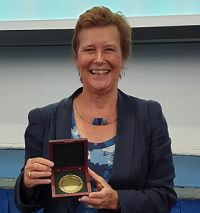Professor Jean Hartley wins British Academy of Management award

Open University Professor Jean Hartley received this year’s Medal for Research from the British Academy of Management (BAM) at its annual conference in Birmingham today (Tuesday 3 September). This was awarded for ‘sustained, original contributions to management research by a BAM member’.
Professor Hartley, who was elected as a Fellow of BAM several years ago, said: “I am greatly honoured to receive this medal from my academic colleagues across the UK and beyond.
I am pleased to receive the medal not only for my own work but also on behalf of an interdisciplinary team of more than 50 academics which I lead across The Open University, and in recognition of the distinctive approach they have developed towards research and practice in partnership and dialogue with practitioners.”
She is an organisational psychologist by background, now focused on the field of public leadership and management in research, teaching and development work. Her previous posts were at the universities of Warwick, London, Sheffield and Manchester.
Since 2013, she has been Professor of Public Leadership at The Open University Business School (OUBS), researching public leadership and management. In all her work, Professor Hartley combines rigorous quantitative and qualitative research with close, interactive engagement with the world of practice.
For example, she is Academic Director of The Open University’s Centre for Policing Research and Learning, an innovative collaborative inter-disciplinary partnership between more than 50 OU academics and 21 of the UK’s 45 police forces, creating research, education and knowledge into practice, and contributing both to theory development, learning and improvements in practice.
Her research and publications address the private, public and voluntary sectors. This includes the value, use and skills of leadership with political astuteness for public servants; the dual leadership of senior public servants working with politicians in local and central government; leadership development and its evaluation for elected politicians and for public managers; leadership to create public value; leadership in healthcare, local government and policing; and leadership in contexts of contest and conflict, for example South Sudan.
She also researches innovation and organisational change in public services, and on how improvement science, knowledge exchange hubs, and inter-organisational learning networks can help to spread learning and innovation. She has also written about research methodology, including case studies and co-research.
Professor Hartley is the author of seven books and numerous articles on leadership, innovation, improvement and organisational change, and public value, in both top journals and in practitioner outlets. She has won numerous research grants from a range of sources including the Economic and Social Research Council (ESRC), charities and foundations and government departments.
A Fellow of the British Psychological Society as well as BAM, other notable achievements include being a member of the Berwick Advisory Group which advised the Secretary of State for Health in July 2013 on improving patient safety in healthcare, including leadership, following the Francis Report.
An honorary trustee of the Friends of Ibba Girls’ School (FIGS) in South Sudan, she is responsible for the monitoring and evaluation of progress and impacts at this school for girls since its inception in 2014.
The Academy's President, Professor Nic Beech, also presented medals to Dr Adelina Broadbridge of the University of Stirling (BAM Medal for Leadership) and Chris Webber of the Cabinet Office (Medal for Management Practice or Policy).
Two more academics were given the Academy’s Richard Whipp Lifetime Achievement Award – Professor Sue Cox OBE of Lancaster University Management School and Professor Abby Ghobadian of the Henley Business School.
The Academy inaugurated these medals a few years ago as part of its 30th anniversary to recognise outstanding and important achievement and service. Nominations are invited from the Academy’s Council, Fellows and Special Interest Group (SIG) Chairs, and then scrutinised by the Awards Committee which makes recommendations to the Executive Committee for ratification.

Upcoming Events
Doing Academia Differently: Professional Development Symposium for Doctoral Students and Early-Career Academics
Tuesday, March 10, 2026 - 09:00 to 17:00
Michael Young Building, The Open University, Walton Hall, Milton Keynes, MK7 6BB
This one-day symposium on ‘Doing Academia Differently’ will provide inspiration and support for PhD and early-career academics to approach the complex tensions and dilemmas of contemporary academia in new and creative ways.
International Women’s Day: Supporting diverse new motherhoods for work inclusion
Thursday, March 12, 2026 - 11:00 to 12:30
Online Webinar - link below
This webinar from our GOP research cluster will discuss findings from research into how motherhood impacts employment for ethnic minority women.